Geoffrey W. Griffin, OGH, MBS, OBE
 House: Grigg/Junior Prefect
House: Grigg/Junior Prefect
Years: January 1945 to July 1950
A Note by Webmaster Steve Le Feuvre (Clive 1970-1975)
It has been my wish for some time to post an obituary on the web site for Old Cambrian, Geoffrey Griffin who died in
Nairobi in June 2005. Griffin was clearly one of the better known Old Cambrians living in Kenya, quite a number of whom
have contacted me about the need for a web site recognition. Thanks to contributors such as Peter Hays and Paul Heim, and
particularly to Brian McIntosh who volunteered to coordinate and write this piece, that long-overdue goal is now
accomplished.
Starehe in Kiswahili means be at ease. Geoffrey Griffin was the founder and Director of
the Starehe Boys Centre which began nearly fifty years ago as two tin huts sheltering a handful of homeless
boys. Since then it has grown to become the famous Starehe School with over a thousand pupils and a counterpart
school for girls. At Griffin’s funeral in Nairobi on July 8th 2005, Kenya’s President delivered the eulogy and
thousands of Kenyans turned out to show their respect and appreciation.
I never had the pleasure of meeting Geoffrey Griffin, but I remember him coming to a couple of events at Nairobi
School when I was there, including one speech day. I invite anyone who knew him at school or during his years at
Starehe to contact me with their personal memories of this remarkable and renowned Old Cambrian.
Geoffrey Griffin, OGH, MBS, OBE13 June 1933 - 28 June 2005
(Obituary appearing in The Times, August 18, 2005, and reprinted in the Kenya
Regiment Association’s mini-SITREP
XXVIII, June 2006.)
While the G8 summit leaders were focusing their minds on Africa, the world lost a man whose inspiration and dedication
made poverty history for thousands of young Kenyans. In 1959 Geoffrey Griffin rescued a handful of destitute boys, found
roaming the streets of Nairobi. It was the time of the Mau Mau freedom fighters, when orphan children, forced to flee
ravaged homes in the countryside, headed for the city. From this simple action grew the Starehe Boys' Centre, an
institution that became one of the most successful schools in Kenya, if not in all of Africa.
Geoffrey William Griffin was born on June 13 in 1933 in Eldoret, Kenya,
the son of an English police officer, who went
to serve in Kenya in 1919, and an English mother, born in India.
Griffin was educated firstly at Kitale Primary School
and then the Prince of Wales School where he ended up as the school
editor and headed the school's scout troop, later qualifying
as Kenya's first King's Scout. When he left school he became a cadet for
training in the Survey of Kenya.
When the State of Emergency was declared in 1952, Griffin completed NS training with the Kenya Regiment, served in the
Special Police Reserve and was later commissioned into the 3 KAR as a 2Lt. But after fourteen months he became sickened
by the brutality of the struggle, increasingly impressed by the justice of the rebels' cause. When his commission expired
he returned home, a soldier no more.
“He joined the Kenyan Civil Service, and in 1964-98 he was the founding director of the National Youth Service. Starehe
started in two tin huts, donated by Kenya Shell and BP. The early days of the centre were extremely difficult, with the
country in turmoil and suspicion rampant over the criminals in Griffin's care. For a short time he even lost his government
job which was the only source of income for the school.
Griffin was, however, skilled at attracting support. ‘Save the Children’ was an early supporter and when in 1971 its
president, Princess Anne visited the school, it was her first overseas visit on behalf of the Fund. The visit was filmed
by Blue Peter, the BBC children's programme, which later raised £3,000 for the school. Through its sponsorship programme,
‘Save the Children’ was able to pay for the education of thousands of boys.
In 1990, Griffin and his school joined the Round Square organisation. Starehe's value to the community was proven during
flash flooding in Nairobi, in which the school's boat service saved many lives. Many Starehe boys spend their holidays
in the bush, helping in small medical clinics, and none of them lose the sense of belonging to Starehe. When the Olympic
athlete Paul Ereng won gold in the 800m event in Seoul, he asked to have his medal presented to him again, in front of
his school, by his revered headmaster and father. Griffin's work brought much recognition including Moran of the Burning
Spear in 1970 from President Kenyatta, Order of the Golden Heart in 1986 from President Moi, and he was appointed an
Officer of the British Empire (OBE) in 2002.
The two original huts still stand at the centre of Starehe School, now a beautiful campus with hall, chapel, library,
dormitories and class¬rooms. Three quarters of the 1,056 boys are paid for by sponsorship from around the world.
Griffin lived to see his other long-held dream realised; the founding of the Starehe Girls' Centre in 2004. In his book
School Mastery (1994) Griffin writes: "It is not enough to give shelter, food and medical care to a poor boy unless one
also educates him to stand on his own feet in life." (Peter Hays, a contributor to this obituary feature, points out
that the school acquired a reputation for excellence throughout Africa, resulting in many prominent people from other
countries, including General Gowon the President of Nigeria, sending their sons to Starehe.)
Griffin never married - being boss of the National Youth Service and Starehe was very demanding and took up all his
personal life and time. It was for this reason that his fiancée had left him in 1967, for when she learnt of his 16
hour-a-day commitment to these two jobs, she realised there would be no time for a family.
Upon hearing of his death on 28 June 2005, the Kenya Parliament finished its business so the Deputy Speaker could pay
tribute to Griffin. Griffin's funeral, a joyful procession of more than 15,000 Kenyans, was attended by President
and Mrs. Kibaki.”
Geoffrey Griffin, OBE, Headmaster, was born on June 13, 1933. He died on June 28, 2005, aged 72, and is buried inside
the chapel of the Starehe Boys School. Thousands of old boys of the school, some of whom had flown in from overseas,
were in attendance.
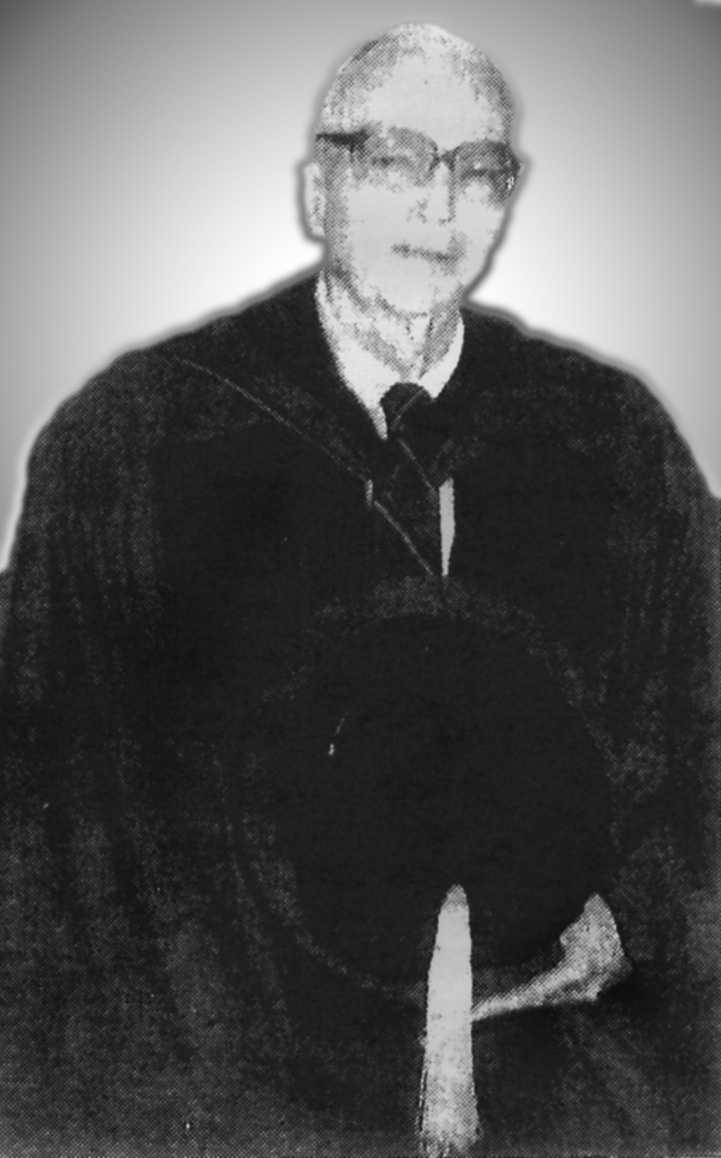
G.W. Griffin on the occasion of his being awarded the honorary Degree of Doctor of Education by Kenyatta University
for his services to the Starehe School and to Kenya education in general. A copy of this photo appeared in the Kenya
Regiment Association’s mini-SITREP XXVIII, June 2006, which is reproduced here by kind permission of the magazine’s
editor, Bruce Rooken-Smith.
Extracts from the speech by His Excellency Hon. Mwai Kibaki, C.G.H., M.P, President and Commander-in-Chief of the
Armed Forces of the Republic of Kenya, during the burial ceremony of the late Geoffrey Griffin at Starehe Boys’ Centre,
Nairobi on 8th July, 2005.
“Ladies and Gentlemen, this is a sad day for all of us, as we gather to pay our last respects to our dear friend and
teacher. The late Dr. Geoffrey Griffin was indeed a true patriot and a great friend of Kenya’s youth. Dr. Griffin had a
vision and a calling to help destitute children. He was faithful to this calling, and today, we are witnesses to the
remarkable legacy that he has bequeathed to the youth of this country. As we pay homage to his departed soul, this is
an opportune time to celebrate his life, his achievements and his dedication to our country
“The greatest honour we can bestow upon the late Griffin is to continue with his noble efforts to provide Kenyan children
with an education and to ensure the sustainability of this institution. Equally important, we must also uphold Griffin’s
concept of training the whole person. As many of you will agree, Griffin’s philosophy of giving maximum trust and
responsibility to students themselves and his emphasis on the intellectual and character development of students,
is education in its best and widest sense.
“This tradition must be upheld if Starehe is to continue to be a center of excellence that produces outstanding
graduates. Personally, I have had the privilege of serving with Griffin during my 35 years as patron of Starehe
Boys Center. During this period we shared our vision for the future of this country. Indeed, during this period I
closely interacted with a man who showed great courage in the face of many challenges. In him lay a solid passion,
undivided attention and love for Kenya’s youth.
“We must not forget that it was Griffin’s dream to see Starehe grow into a vibrant, internationally acknowledged
institution of higher learning. We must not allow this vision to pass away with him. I challenge the Board of Directors of
Starehe, the Old Boys association, well-wishers, corporate firms and charitable institutions to explore the possibility of
establishing a Griffin Trust Fund dedicated to the education of destitute children and the realization of the noble dream
of a Starehe University. On its part, my Government will continue to partner with Starehe with a view to keeping the late
Griffin’s vision alive.” (For the President’s entire speech,
Click here).
Brian McIntosh (Rhodes, 1953-59), writes:
Like Webmaster Steve Le Feuvre, I never met Geoffrey Griffin, but I was certainly aware of the existence of the Starehe
Boys Center during my years in Kenya. After coming across his obituary in the Kenya Regiment Association’s mini-SITREP
XXVIII of June 2006, I was astonished to realize that no mention of him existed on the Old Cambrian website.
(Griffin’s Regimental number, by the way, was KR4233.) But thanks to the Herculean accomplishment of Martin Langley
(Nicholson, 1956-61) in producing the Impala Magazine CD in 2006, I was able to dig up the
following information about Griffin both as a school boy and an Old Cambrian.
Although he joined the Prince of Wales School in January 1945, G.W. Griffin does not appear to rate a mention in the
school magazine until the June 1948 issue when he was listed among the boys who passed the Cambridge Overseas School
Certificate. This is perfectly normal, given that prior to School Cert one was either a lowly rabble or a spotty-faced
adolescent whom nobody bothered to notice. It was even worse if one was also a stinker or day boy, as Griffin appears
to have been, a Mr. and Mrs. Griffin having attended a luncheon for parents of day boys hosted by headmaster Phillip
Fletcher on June 13 1948.
Yet Griffin’s day as a leader was about to dawn. In the December 1948 Impala we read that:
“A Scout Troop was formed here when the School began, but it had disappeared before the war. During the August holidays,
however, it was revived in the fertile and energetic mind of G. W. Griffin; and at the beginning of term he started a
Troop among the Juniors and Intermediates. There are now 40 boys in the Troop. A Senior Patrol of eight boys has just
been started in New House, and it is hoped that the same thing will happen in other Houses in the near future.
We particularly congratulate G.W. Griffin on the revival of the 2nd Nairobi Scout troop.
Further achievements and recognition were soon to follow, as reported in the scouting section of the July 1949 Impala:
“The Group is making extremely good progress, and several notable events have taken place. In April the first King's
Scout Badge to be gained under the new regulations in Kenya was won by Group leader G. W. Griffin, and the Group was
officially congratulated at the Scout Council meeting at Government House. During last term two seats on the Nairobi
Scout Executive Committee were given to J. L. Beecher and G. W. Griffin, probably the first time that non-adults have
sat, on it. On May 3rd the Group took a leading part in the Annual Scout Council Meeting. A detachment was inspected
by H.E. The Governor, the G.O.C. and the Air Officer Commanding. The School fete on June18th was opened by Sir Godfrey
Rhodes, the Chief Scout Commissioner who inspected the Group.”
By December 1949 Griffin had been promoted to Assistant Scout Master with two troop leaders under him. In his report
he talks about having had a most successful and enjoyable year, and makes a special point of expressing the Group’s
“sincere gratitude to Mr. P. Fletcher for all his help and encouragement”.
1949 was also the year in which Griffin became a prefect in Junior House whose Notes for the year observe that “The Scouts
under G. W. Griffin are a small but select community,” mentioning also that Griffin was the prefect in charge of the
dayboys.
In the July 1950 edition under Band Notes, we learn that “the school band appeared before the governor Sir Philip Mitchell
on the occasion of G.W. Griffin’s appointment to King Scout.” We also note that Griffin, now in Form VA, decided that
university was not what he wanted to pursue, and so he left to join the Kenya Survey Department at the end of the second
term. The Scout group he had so ably led said farewell in the December 1950 Impala:
At the end of last term G. W. Griffin left school and the Group lost the second of the boys who had helped to re-found
the Scout Troop in the School. (The other re-founder was J.L. Beecher.) So long as Scouting remains in the school,
Griffin's part in its development will be remembered, and our thanks are due to him for all the hard work he put into
the Group. It is good to know that his connection with Scouting in Nairobi is continuing.
And no doubt, Griffin returned to observe the ceremony during the third term of 1959 at which I. C. Rodger and G. J.
Beers received their King Scout Certificates from the visiting Chief Scout of the Empire, Lord Rowallan.
As evidence of his continuing involvement with scouting, Griffin is mentioned in the 1957 Impala as having
re-formed the 2nd Nairobi Scout Group, Combined European Secondary Schools District, in January that year, with meetings
being held each Sunday at the Duke of York School.
Being the 100th anniversary of the birth of Lord Baden-Powell and the 50th anniversary of the founding of scouting in
Britain, 1957 was a busy year for scouts. At a very personal level, one event that remained imprinted on scouting
memory was “a camp in Embu district which became known as Caterpillar Camp, due to the number of hairy caterpillars
which abounded there, adding enormously to the discomfort of the campers!”
Another notable event of 1957 was when “G. W. Griffin (1950) combined scout-mastering with big game shooting and
disposed of one of a pride of lion which was molesting a cattle manyatta.”
Now a civil servant, Griffin’s involvement with Kenya African youth had become his life’s mission. The 1958 Impala
talks about his being the Colony Youth Organizer and running camps for Kenya Youth, and it notes his appointment as an
Inspector of Children under the provisions of the Prevention of Cruelty to, and Neglect of Children Ordinance.
In 1959 Griffin established the Starehe Boys Center. In 1960, the Impala states that “He left for the USA in
August to take part in social welfare and community activities in New York City, having been awarded a specialist
grant under the United States international educational exchange programme. Griffin Is Chief Executive Officer of
the Kenya Association of Youth and is responsible for the operation of 127 training centres dealing with more than 20,000
children and young people throughout the colony.”
It was already an impressive record for one who had left school barely ten years earlier to join the Survey of Kenya. Even
greater accomplishments lay ahead.
Postscript
Geoffrey Griffin, a man who gave so much, and who is regarded with esteem and affection by so many, belongs in the
company of earlier distinguished Head Masters such as Dr. Carey Francis of the Alliance High School and Philip
Fletcher of the Prince of Wales. As Fletcher used to do so well, Griffin too would send school leavers out into
the world with an inspirational message of hope and encouragement. In his own words:
“This world is full of people who do their duty half heartedly, grudgingly and poorly. Don’t be like them.
Whatever your duty is, do it as fully and as perfectly as you can. And when you have finished your duty go on
to spare some of your time and talent in service to less fortunate people, not for any reward at all, but because
it is the right thing to do. Follow my advice in this and I promise you that your lives will be happy and successful.
May God bless you all.”
Geoffrey W. Griffin By Those Who Knew Him
Peter Hays (New House, subsequently renamed Grigg, 1945-1949)
When Geoff and I went to Kitale School at the age of six as day boys, we were neighbours. His father was a policeman
and mine the Postmaster. Always in the same class, we progressed to the POW after the Kenya Preliminary Exam. I was a
boarder and he a day boy as his Dad had been transferred to Nairobi in the Railways Police and they lived in Railway
quarters in Parklands.
Our parents had become good friends in Kitale so I used to be invited to their home on Sundays and Mrs. Griffin and the
two boys would visit and stay with us in Kisumu where my father had been transferred. After school our paths diverged for
the first time in over ten years when I joined the Customs in Mombasa and he went on to achieve much glory. I last saw
him when we visited Kenya from the UK in the late 1970's and he gave us dinner and a conducted tour round the school for
my wife and me and our three children.
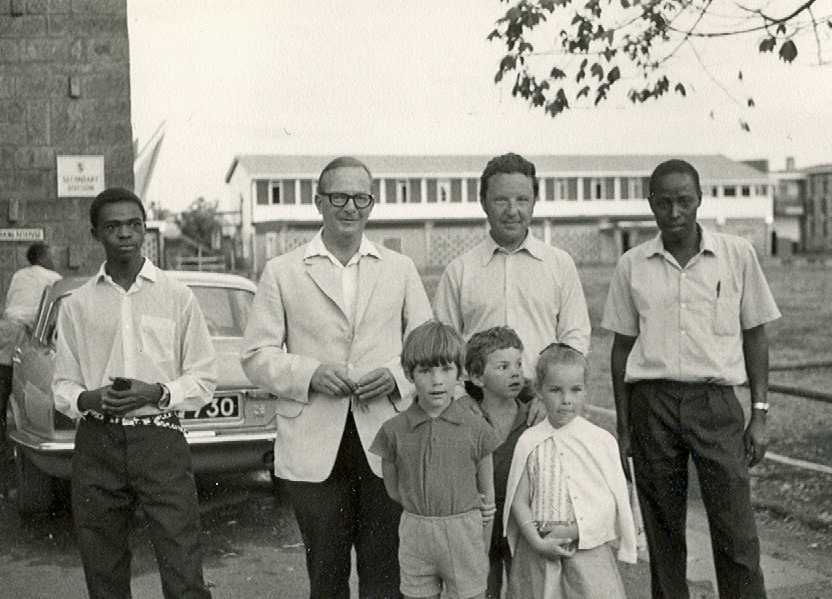
In this photo, taken at Starehe in 1972, the Head Boy is on the left, then Geoff Griffin, then me, and then a teacher
at the school. In front are the Hays children of whom the little boy in the centre is Graeme, Nairobi born, and now
Professor of Marine Biology at the University of Wales, Swansea!
I remember Geoff at school as bright but not brilliant, a great reader of adventure stories, but totally disinterested
in all forms of sport. But what stood out was his inventiveness and single-mindedness. He was always willing to try
something new such as smoking our first cigarettes at about the age of eight or nine in a culvert under the Kitale/Eldoret
railway line. They were from a packet of ten Scissors cigarettes! Funny isn't it that useless information sticks in the
brain but more important things are forgotten.
Geoff had a younger brother Don who also attended the PoW. He was working for the Landing and Shipping Co in Mombasa
in the 1960's when he had a tragic accident at his home at Port Reitz and electrocuted himself. He left a young widow
and two children. The widow subsequently remarried in the UK but Geoff told me when we last met that he was assisting
financially with the upkeep of his nephew and niece.
There was a CNN programme on Africa which featured Geoff extensively and was shown a couple of years before his death.
The reporter noticed a cane on the wall behind his desk and on enquiring was told by Geoff that he had discontinued caning
some years before, finding it far more effective to make offenders don their 'street' clothes and then send them back to
the slums where they came from for a day or two! He was a great man who I am proud to have known as a good friend.
(Webmaster’s note: we owe Peter Hays a special debt of
gratitude, not only for his personal reminiscences, but also because it was he who got the ball rolling on this
Griffin tribute by submitting the Times Obituary both to us and to the Kenya Regiment Association’s mini-SITREP magazine.)
Paul Heim (Hawke/Scott, 1946-1950)
Geoffrey Griffin and I were prefects in Junior House at the Prince of Wales School at the same time in 1950. My
recollections of him are slender. He was more of the quiet type, not quite a loner, but reflective. There was at that
time no sign of the visionary teacher and educationalist he was to become, nor of the obvious sympathy he felt for the
underprivileged, nor of the great things he was to do for the Starehe boys home.
He was a conscientious prefect, anxious that things should be done right. He obviously thought about his duties, and
tried to have a system in what he did; the rest of us made it up as we went along. Perhaps school was not as fulfilling
for him as it could have been, and he clearly left the classic path of school and government service as soon as he could.
It is obvious from his great success in creating Starehe that the reflective single-mindedness he practiced at School
became a highly successful and convincing method.
It is gratifying that he was so honoured by the country and the people he served so well all his life. The Prince of
Wales School can be proud of having produced a man who put the ideals of service which we learned into practice, a man not
in the common mould.
Keith Davies, Duke of York School (Elliot House to 1958)
In 1957 I was privileged to be a member of a scout troop run by Geoffrey W. Griffin. Unfortunately I cannot remember
it's name, however we prided ourselves on the fact that we were " bush " and not " town " scouts! We still respected
all the scouting principles and tried to improve ourselves and our abilities by achieving the various badges under Mr.
Griffin's guidance.
As the pictures that follow show, we were a motley bunch made up of young European scouts and African youngsters.
The latter came from what I believe were called "approved" schools. I seem to remember that Mr. Griffin had a lot
to do with saving them from becoming involved with the adult “Mau Mau" suspects in detention camps like the one at
Manyani. He was a tolerant, trustworthy, and decent man who was always willing to give the benefit of doubt to those
around him. He was well respected and admired.
Of course for a 15 year old living in a suburb of Nairobi, I was thrilled to be taken on adventures into the wilds of
Kenya even though at times it was very hard work setting up camps etc on our journeys. We also had to endure all types
of weather including intense heat and tropical thunderstorms. Looking back, all this enhanced our adventures, especially
as on one trip we could not return home across a river due to flash floods - so we had a few more days on "safari".
For your interest I have attached a few photos of the lion mentioned in your website feature that had been "molesting"
cattle in 1957. I have no clear memory of exactly where the lion was shot or who was present at the kill - I was not.
However as you can see in the photos, I and other poseurs did our best to get in on the aftermath.
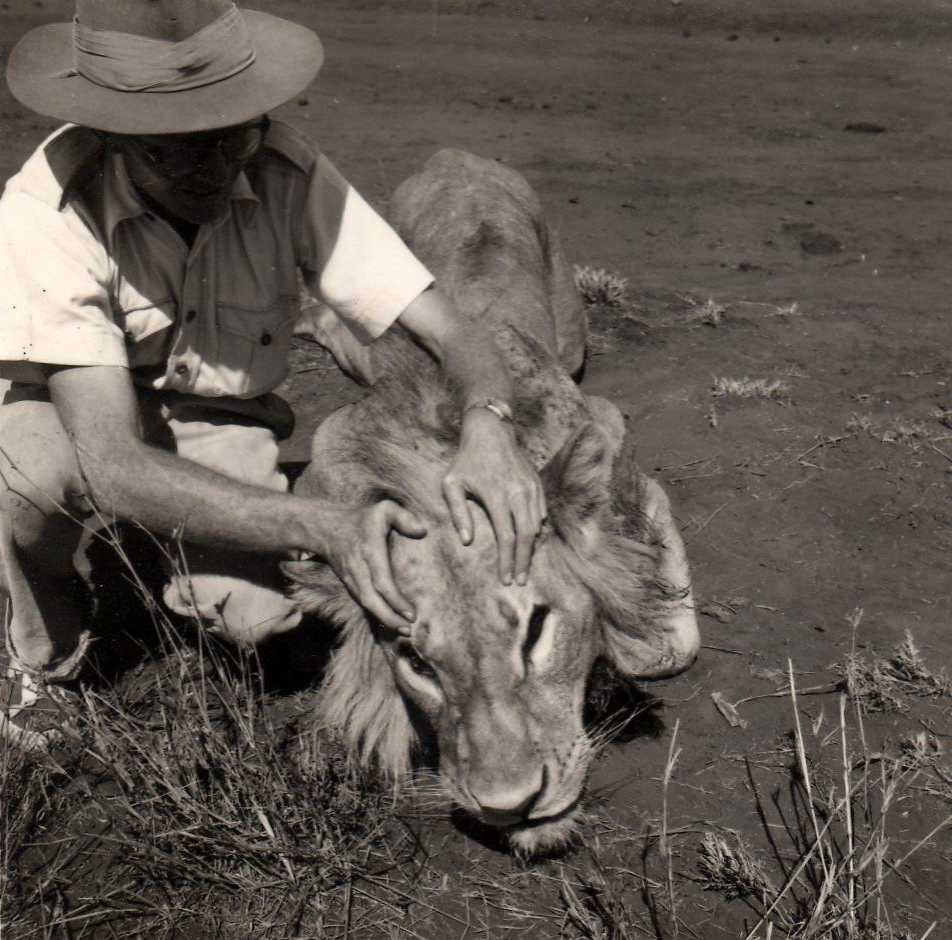
Geoffrey W. Griffin with the lion he shot in 1957.
(Readers may recall that in legend and in heraldry, the Griffin or Gryphon is a
creature with the body of a lion and the head of an eagle.)

Keith Davies, pictured here with Griffin’s lion, writes, “I have a lion skin hatband
and woggle somewhere - presumably acquired from this incident!”

Scout troop with the lion. Keith Davies in white tee-shirt stands in rear row.
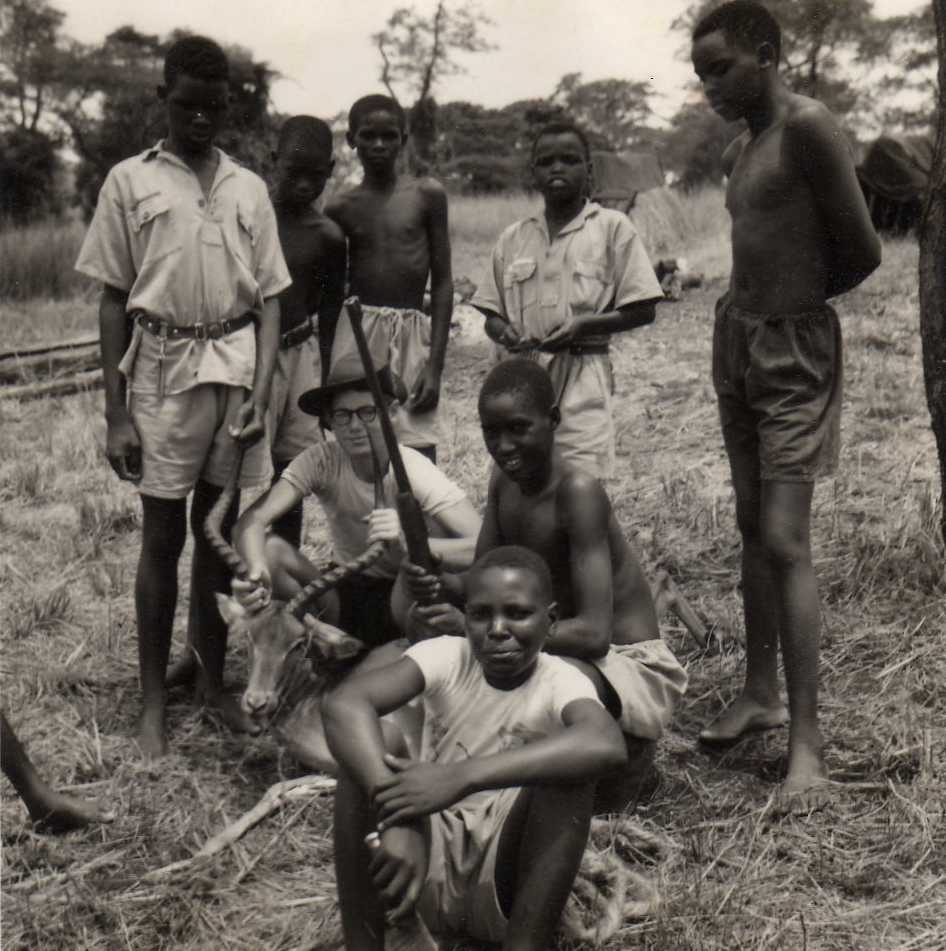
Keith Davies, pictured here with fellow scouts, writes, “Mr. Griffin was the only member of our party with a
rifle and I believe he did have hunting experience. Besides shooting the lion, he
also provided fresh game meat,
when required, such as the Impala in this photo.”
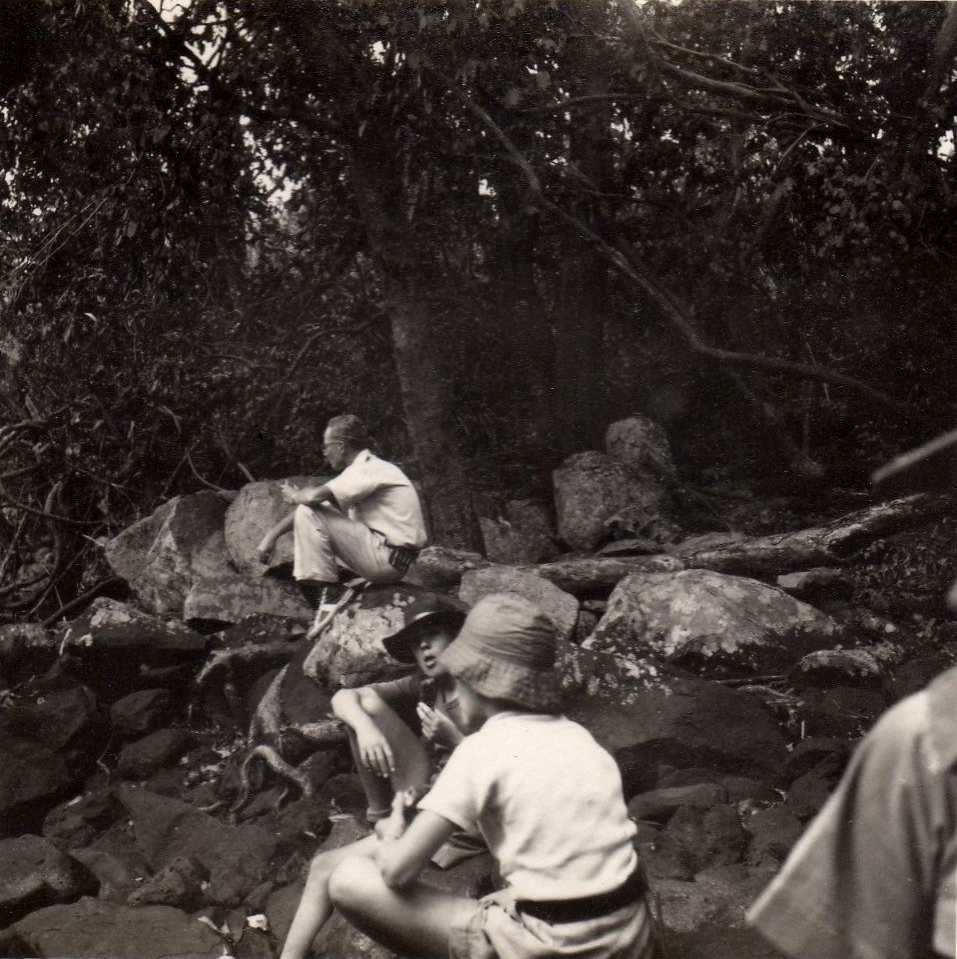
Geoffrey Griffin, in a quiet, reflective moment, with his scouts in 1957.
The foregoing photos were submitted by Keith Davies who attended
the Duke of York School until 1958.
(Webmaster’s note: other contributions from Old Cambrians, and anyone else who knew Geoffrey Griffin, will be posted
here as they are received.)
click here for details
|


















